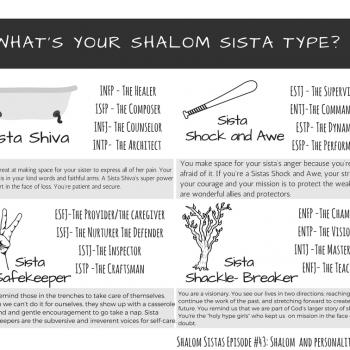This morning I went a workshop on Islam. Like most of you, I’ve been watching the news and completely heartbroken about what our Muslim brothers and sisters are going through. Between Isis and the refugee crisis and attacks from politicians, I feel deeply for them.

As a Shalom Sista, I’m wondering what peacemaking looks like for me— a Western believer with limited influence and very little access to policy-makers/changers.
Is there something I can do in light of the brutality?
Where there is violence, how can I bring peace?
While these questions are fun thought experiments, they revealed something very uncomfortable in my heart: I don’t know anything about the Muslim faith. To me, they are “the other”— people who I have no understanding of. I’m ashamed to say that sometimes, I’m afraid of Muslims.
I do have some friends who are Muslim but the specifics of their faith, I do not know.
And yet, in my pride I think just by virtue of my following of Jesus Christ, the Prince of Peace, I have a good handle of the things that make for peace.
Not so.
If I am to share in their sufferings and seek their shalom then it’s imperative that I study their faith. I need to honor them as competent and earnest image bearers by coming to the table with a working knowledge of what they believe. My first practice of Shalom whenever I encounter “the other woman” is to humanize her until she became as dear to me as my sister. This is why I attended the workshop this morning.
What I thought I would get in that class was a person-centered teaching of the Muslim faith. Stories and examples, and lots of gracious language. Instead, I got lots of training in apologetic and Arabic and too much us/them language.
A call to remember the people who hold a perspective was missing.
Unfortunately, this is par for the course whenever I attend a class on other religions taught by an Evangelical. We have to do better. Because a teaching of other faiths devoid of a reminder to love the people who hold those faiths, leaves a foothold for the enemy to use fear, prejudice, and pride to consume us.
I saw this play out during the Q&A time when someone asked what they should do about a devout Muslim in their community who happens to be a pillar— a man who owns the largest construction company and employs many people, and gives houses to the poor. The answer wasn’t go and learn from this man what he believes, befriend him, and let him encounter Jesus through your life. It was to discern how devoted he is to the five pillars of the Islamic faith and then be prepared to tell him how they do not worship the same God as Christians.
This response grieved me. Not only on a theological level, but an ethical level. This was a moment where a fellow believer was revealing their own confusion and instead of inviting him to sit in that and let Jesus be his peace, the presenter gave him words to use as a weapon.
When we spend time learning about other faiths, yet strip them of the very human, very real, very vulnerable people who follow that faith we are in danger of losing that essentially Christ-like characteristic of humility. We become bible-thumpers and brow-beaters. We become like the Pharisee.
My childhood is littered with spray painted posters that read, “Knowledge is Power”. This is true. The more we know, the more resources we have access to and the easier it is to move through this world. We should always be learning and if we’re so gifted, we should always be teaching, but the primary responsibility of any teacher is to show us what to do with our newfound power. For the Christian teacher, we are charged with grounding our audience in the example of Jesus’ self-giving, universal love before teaching new information.
Too often in the Christian church we empower ourselves with teachings of doctrines of cults and other religions or even fellow believers who hold different positions, then we rush out to crush others what that power.
This is called, a “power-over” approach to conflict. We use our knowledge to force others to submit to our wills, we crash over them like a 15 foot waves, choking them with our words and drowning them in our self-righteousness. This is the beheading of infidels and the droning of suspected terrorists and the reading of Leviticus 20:13 to our gay nephew across the kitchen table.
Power-over use of any knowledge is fueled by insecurity and fear. It’s Satan’s favorite way to destroy relationships.
No, Dear Believers, we are called to be as wise as serpents and gentle as doves. Basically Jesus told his disciples, Look you are going to encounter those with wrong beliefs about me. In fact, I’m sending to those who would devour you like wolves. Yet, you my people, are to be humble like sheep, gentle like dove, willing die to yourselves. Like me.
This is power-under use of knowledge that’s marked by humility, love, and KINDNESS.
This is taking our knowledge, our revelations, our experiences of Jesus, God’s truth, and using them to serve those we encounter. It’s choosing to process the differences between God, The Father and Allah with our Muslim friends with dignifying language full of questions and void of declarations. It’s knowing the scriptures that says Islam is a religion of peace and asking a Muslim co-worker if you can compare Jesus’ example of peace with those in the Qu’ran, then inviting them to pray for the peace for the world with you. It’s asking the Holy Spirit to convict you whenever you feel like you are better. It’s holding information as carefully as you would hold a loaded gun— for you have a healthy respect that a misfire could quite possibly result in a casualty.
I’m going to spend the rest of the week thinking about what I learned about Islam and hopefully, I’ll have a Shalom Sista on the podcast who has navigated these waters of loving her Muslim friends well. If you know of anyone please comment below.
I’m always eager to know more, but I’ll always follow this rule for peacemaking in a diverse world:
Love, learn, live.
Love the other because she is deeply loved by God.
Learn as much as I can about her: her story, her faith, that thing that positions her as the “other”.
Live in unity and peace with her to the best of my ability.
Wanna join me?
Shalom Steps:

Think about how can you take something you’ve learned recently and use it to serve someone who feels “other” than you.
Write a prayer for the other woman.
Ask Jesus to remind you of a time you’ve felt “other-ized” and ask the Holy Spirit to knit empathy in your heart for the next time you’re tempted to use power-over “the other” instead of power-under.















